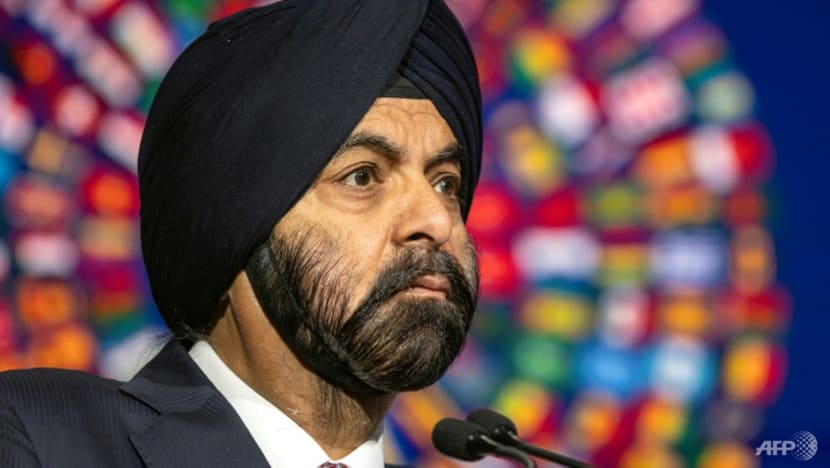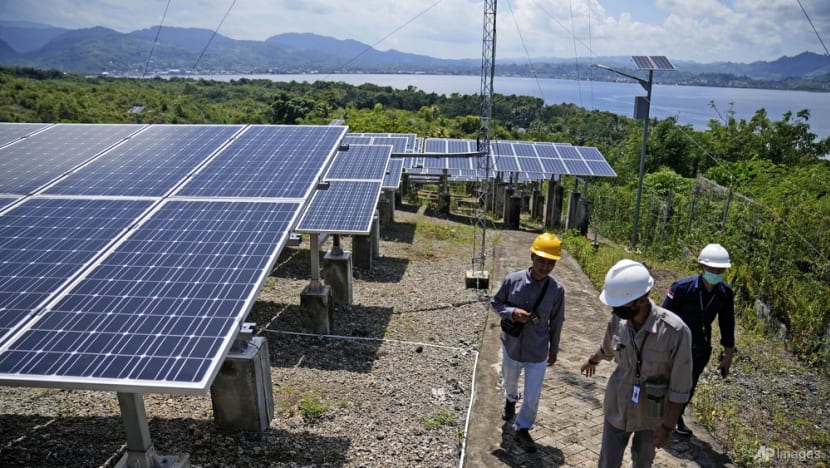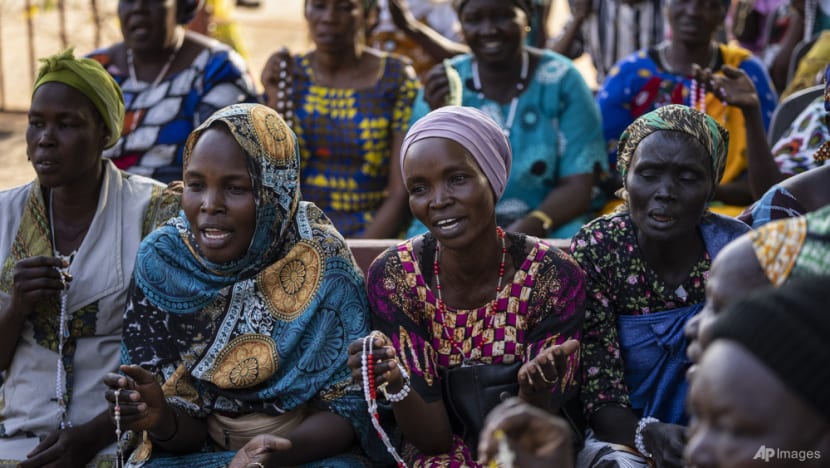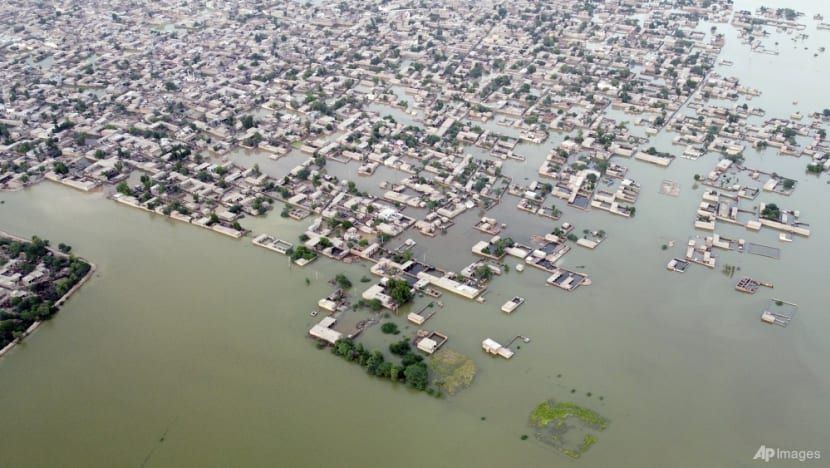Stronger private sector role, tapping AI can help in global poverty battle: World Bank chief
In a broad-ranging interview with CNA, World Bank president Ajay Banga also addressed concerns over a new “loss and damage” fund to help countries most vulnerable to the impacts of climate change, while highlighting the need to plan economically for the end of the wars in Ukraine and Gaza.


This audio is generated by an AI tool.
SINGAPORE: The private sector needs to be involved in the global fight against poverty as there is not enough money in the public sector and philanthropic organisations alone, said World Bank president Ajay Banga on Friday (Nov 17).
Apart from capital, the private sector also brings innovation, technology and expertise to the field, he told CNA on the final day of the Singapore FinTech Festival (SFF).
The three-day event, held at the Singapore EXPO, brings together policy, finance and technology players from around the world to discuss cutting-edge financial solutions, evolving regulatory landscapes and the latest technological innovations.
In a broad-ranging interview, Mr Banga said that artificial intelligence (AI) will be a big enabler, especially for the developing world, as platforms like ChatGPT will not just help people get information but know what to do with it.
Mr Banga, who was elected in May this year, added that he is trying to change the way the World Bank operates, as it addresses the various intertwined challenges globally.
ROLE OF PRIVATE SECTOR
Mr Banga noted that “there's not enough money in the MDB (multilateral development bank) system or governments or philanthropies, to meet the ambitious requirements that we have”.
“You have to get the private sector, their capital, their ingenuity, their technology (and) their innovation into the game,” he said.
Mr Banga cited the example of renewable energy projects, in which investors would want to fully understand the risks before making commitments.
“Let's take a middle-income country, where we now know that solar and wind energy are cheaper per unit than fossil fuel, but the capital put up front is higher and the gestation period of the project might be longer,” he said.
“But you know it's going to be cheaper, which means it's the right thing to do (and) environmentally the right thing to do.”

Securing those investments requires regulatory clarity, and potential operators will want a clear roadmap for renewable energy in that country, which commits to market reforms such as tariff and distribution policies.
“If I know that, that's a risk I can deal with. I can deal with operating risk, management risk, what I can't deal with this political risk,” explained Mr Banga.
Another issue is foreign exchange risk, because investors may use dollars and euros, but get paid in the currency of the local market, he said.
While some countries have deep enough foreign exchange markets to hedge, some do not, and may require help to develop the local currency market over a period of time, said Mr Banga.
“So there's a series of things we have to do with the private sector on improving their feeling of managing risk, as well as their access to these tools. That's what we're working on,” he said.
FROM KNOWING TO USING INFORMATION
Mr Banga noted that technology “democratises access” to information and advancement.
“It changes the ability and the rules for access, and therefore it takes away the advantage, or the incumbency advantage, that people have,” he said.
He cited the example of ChatGPT, the large language model-based chatbot launched in November last year, which lets users access information they would not otherwise be able to, and also write things in a really good way.
“What I think AI will do is change the premium between just knowing things, and so-called knowing how to put a greater premium in how you use them, in how you manage them and how you extract value on them,” said Mr Banga.
He drew parallels with Singapore President Tharman Shanmugaratnam’s idea that there will be a higher premium placed on jobs requiring EQ rather than IQ. On the first day of the SFF, Mr Tharman had said in a fireside chat that AI will change the traditional hierarchy of jobs.
Adopting such a lens when looking, especially at the developing world, will be a game changer, said Mr Banga, adding that digitisation and the use of data will be big enablers in the shift.
“It will change how we approach climate, it will change how we approach education and health in our human capital efforts, it will change how we approach anti-corruption platforms, it will change everything,” he said.
EVOLUTION OF THE WORLD BANK
Mr Banga said the World Bank, which was established in 1944, needs to respond to the challenges of the modern age.
“The thinking that you could somehow isolate dealing with poverty and shared prosperity, from the challenges of climate, pandemics, fragility, conflict, violence, soil degradation ... I think that logic has been shown to be invalid. These are intertwined challenges, and they affect each other very quickly,” he said.
He said the COVID-19 pandemic exemplified this dynamic, as it undid any gains made by the world in the previous 30 years in the fight against poverty.
Mr Banga said the bank is now giving its staff, who are subject matter experts in the field of development and have “worked in difficult environments in challenging countries”, more freedom at work so as to tap on their ingenuity to find solutions.
“I'm trying to tell them that eradicating poverty on a liveable planet is their job, meaning don't pick and choose if you have to ensure clean water, clean air, health (or) education … Otherwise we cannot eradicate poverty,” he said.
Another focus is on women, a segment which forms half the world’s population, noted Mr Banga.
“Even in the developed world, they do not have access to the same opportunities right from childhood to much later in life. In the developing world, it's even more challenging,” he said.
“Therefore, focusing on them and changing the fact that half the world's population must be as productive and as entitled as the other half, is important.”

Young people are another focus of the World Bank, as the Global South is full of them, said Mr Banga.
“They are supposed to be a demographic dividend. They will be if they have clean air and clean water and health and education when they are growing up, and a job when they are grown up,” he said.
He added that the world is also lagging behind in terms of job creation. While 1 billion young people will become eligible for a job in the next 15 years, only 350 million jobs are set to be created.
Mr Banga said he is trying to change the way the bank operates in terms of efficiency and effectiveness, and in partnership with other MDBs, the private sector, governments, think tanks and philanthropy.
“Finally, I'm trying to also work on the capital adequacy of the bank, because if we want to work with the private sector, I need to be able to work with them with the right level of balance sheet,” he said.
“I'm trying to make it a better bank and a bigger bank.”
LOSS AND DAMAGE
He also addressed concerns that a new “loss and damage” fund to help countries most vulnerable to the impacts of climate change, could put developing nations at a disadvantage as it gives donor countries an outsized influence over the fund.

Mr Banga was the US nominee for the top job at the World Bank, which will house the fund, while the US is one of the top emitters globally.
“The first thing is the ‘loss and damage’ fund is not going to be controlled by the World Bank. This is a misunderstanding,” he said.
He stressed that the fund will just be housed at the World Bank, like many of the other trust funds there today which are run by their own boards.
Forming the “loss and damage” fund’s board will be the Group of 77, the largest intergovernmental organisation of developing countries in the United Nations, as well as donor countries, he said.
The World Bank is not going to make its own decisions on how to raise money for the fund, or how to use the money, said Mr Banga.
“All we will be is the agency that ensures that it's managed with clarity. The actual decision-making will still rest with people from the Group of 77 and the donor countries. So I'm actually less worried about that than other people are,” he said.
POST-WAR RECONSTRUCTION
Noting the double wars happening in Ukraine and in the Gaza Strip, Mr Banga said: “I think conflict is just bad for development.”
He said that it is a problem across the world, noting that there are also conflicts that have been taking place in Africa, which people may tend to forget with the media attention on Ukraine and Gaza.
“The way the bank works on this is through a systematic long-term way of thinking. Take Ukraine. There, through the generosity of a number of governments, we are actually the agency that provides the money into Ukraine for the government to be able to work.
The World Bank also works with other bodies, such as the European Union (EU), to create an estimate for how much money will be needed for Ukraine’s reconstruction when the war is eventually over.
For the ongoing war between Israel and Hamas, Mr Banga wants to bring together a group of people who can help advise the World Bank on the right social and economic construct for the territory, or what will need to happen to rebuild it, when the war ends.
“I'm not in a position to change the trajectory of the war. I'm not in a position to decide who will administer or run those territories,” he said.
“I am in a position to decide and help with how to make economic consequences after the war change. That's what I want to be prepared for. It's hard (but) that's the idea.”














